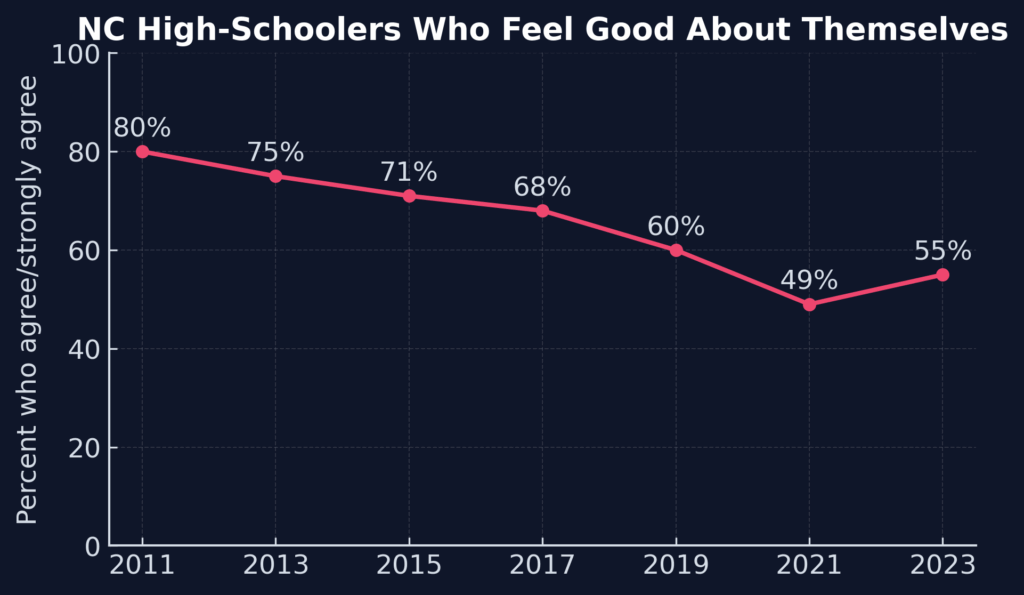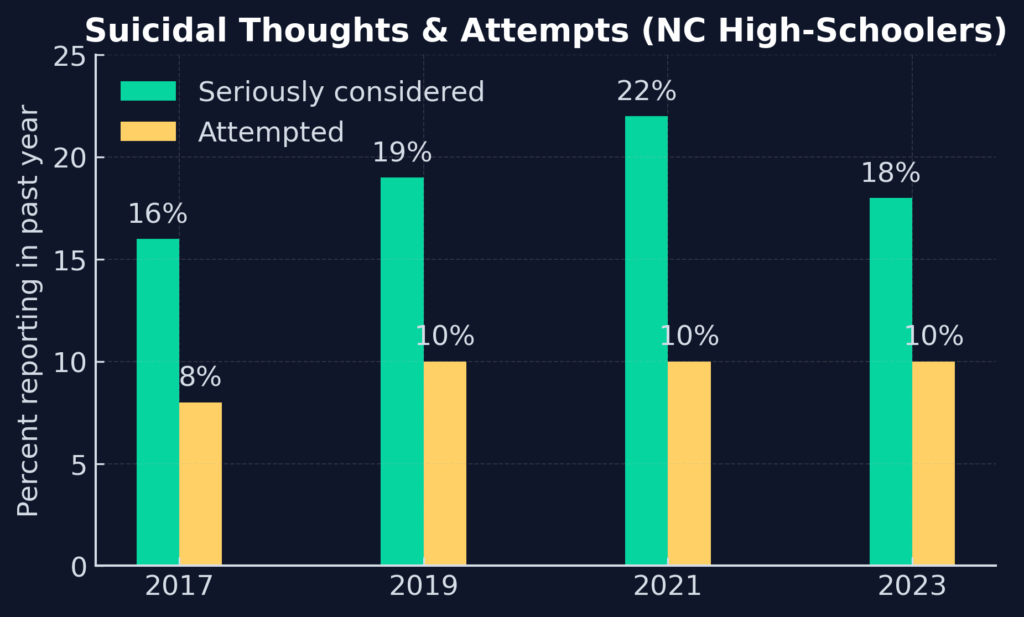North Carolina’s teenagers are facing an unprecedented mental health crisis that demands immediate attention and compassionate action. As parents across the state witness their children struggling with anxiety, depression, and other mental health challenges, understanding the scope of this crisis becomes crucial for finding effective solutions and hope for the future.
Teen Mental Health Statistics in North Carolina
Recent data reveals alarming trends in teen mental health across North Carolina. One in five North Carolina high school students seriously considered attempting suicide in 2021, up from 16% in 2017. One in ten reported actually making an attempt. In 2020, an unprecedented 67 children (ages 0-18) died by suicide in North Carolina. These statistics represent real families, real children, and real communities struggling with pain that often goes unseen.
The mental health landscape for North Carolina teens has deteriorated significantly over the past decade. The number of North Carolina high schoolers who said they felt good about themselves fell from 80% in 2011 to 60% in 2019 (the year before the pandemic) and fell again to 49% in 2021. This dramatic decline in self-perception among teenagers signals a deeper crisis that extends far beyond typical adolescent challenges.

The state’s youth are grappling with complex mental health conditions at unprecedented rates. More than one in 10 children ages 3 to 17 in North Carolina had a diagnosis of depression or anxiety in 2020. That’s an increase of 49% since 2016. These numbers reflect not just statistics, but the lived experiences of families watching their children struggle with overwhelming emotions and mental health challenges.
Perhaps most concerning is that suicide is now the leading cause of death among youth ages 10-14 in North Carolina. This sobering reality underscores the urgent need for accessible, effective mental health resources specifically designed for adolescents.

Understanding the Contributing Factors
The teen mental health crisis in North Carolina doesn’t exist in isolation. Multiple factors contribute to the challenges facing young people throughout the state. Social media and technology, while offering connection opportunities, have also created new pressures and comparison-driven anxiety among teenagers. The lingering effects of the COVID-19 pandemic disrupted critical developmental years, leading to increased isolation and disrupted social connections that are essential for healthy adolescent development.
Academic pressures have intensified, with many teens feeling overwhelmed by college preparation, standardized testing, and competitive environments. Economic uncertainty within families creates additional stress, as teenagers often absorb and internalize their parents’ worries about financial stability and future security.
Environmental factors specific to North Carolina also play a role. The state has experienced significant challenges in accessing mental health services, particularly in rural areas where resources may be limited. Weather-related disasters, including hurricanes and severe storms, have traumatized communities and created additional mental health stressors for families already struggling with existing challenges.
The Unique Challenges Facing North Carolina Families
North Carolina families seeking mental health support for their teenagers face significant barriers to accessing appropriate care. With a population of almost 10 million people, North Carolina is among the top 10 most populous states in the United States. This ranking highlights the substantial gap between need and available resources throughout the state.
The shortage of specialized adolescent mental health services creates a particularly challenging situation for families. Many parents find themselves searching desperately for appropriate treatment options while their teenagers continue to struggle with deteriorating mental health. Traditional outpatient therapy, while valuable, may not provide the intensive support needed for teens experiencing severe depression, anxiety, self-harm behaviors, or suicidal ideation.
Geographic barriers compound these challenges. Families living in rural areas of North Carolina often face hours-long drives to access specialized mental health services. This distance creates additional stress for families already dealing with the emotional and financial strain of supporting a teenager in crisis.

The Importance of Early Intervention and Comprehensive Care
Early intervention in teen mental health challenges can make the difference between temporary struggles and long-term mental health difficulties. Research consistently demonstrates that adolescents who receive appropriate mental health support during their teenage years develop better coping mechanisms, stronger relationships, and more resilient approaches to life’s challenges.
Comprehensive care for teenagers requires addressing multiple aspects of their lives simultaneously. Academic support ensures that mental health treatment doesn’t derail educational progress, while family therapy helps repair and strengthen relationships that are crucial for long-term recovery. Peer connections and social skills development help teenagers build the support networks they need to maintain their mental health gains over time.
The most effective teen mental health treatment integrates evidence-based therapeutic approaches with experiential learning opportunities. Cognitive Behavioral Therapy (CBT), Eye Movement Desensitization and Reprocessing (EMDR), and family therapy provide the clinical foundation, while outdoor experiences, creative arts, and skill-building activities help teenagers apply their therapeutic insights in real-world settings.
Hope Through Relationship-Based Treatment
Despite the sobering statistics surrounding teen mental health in North Carolina, there is reason for hope. Effective treatment approaches recognize that healing happens within the context of relationships. When teenagers feel genuinely understood, supported, and valued, they develop the internal resources necessary to overcome mental health challenges.
The natural beauty of North Carolina provides unique opportunities for healing and growth. Mountain environments offer peaceful settings where teenagers can step away from the pressures and distractions of daily life to focus on their mental health and personal development. The slower pace of mountain life allows for deeper reflection and the development of mindfulness skills that serve teenagers well throughout their lives.
Outdoor experiences have proven particularly beneficial for adolescents struggling with mental health challenges. Hiking, fishing, team challenges, and other activities help teenagers build confidence, develop problem-solving skills, and create positive memories that counteract negative thought patterns. These experiences also provide metaphors for overcoming life’s obstacles and building resilience.
Building Family Strength and Community Connection
Effective teen mental health treatment recognizes that teenagers don’t exist in isolation from their families and communities. The most successful interventions work to strengthen family relationships, improve communication patterns, and help parents develop the skills they need to support their teenager’s ongoing mental health.
Family therapy helps address the relational patterns that may contribute to or maintain mental health struggles. When families learn to communicate more effectively, set appropriate boundaries, and support each other through difficult times, teenagers develop a stronger foundation for their recovery and future resilience.
Community integration becomes crucial as teenagers prepare to return to their home environments. Helping young people develop connections with positive peer groups, mentors, and community activities creates a support network that extends far beyond formal treatment settings.
The Role of Residential Treatment in Teen Mental Health Recovery
For teenagers experiencing severe mental health challenges, residential treatment can provide the intensive support necessary for meaningful recovery. Residential programs offer 24/7 therapeutic support in a structured environment designed specifically for adolescent development and healing.
The advantage of residential treatment lies in its ability to remove teenagers from environments that may be contributing to their mental health struggles while providing comprehensive, coordinated care. When clinical therapy, academic support, family work, and experiential learning are integrated into a cohesive treatment approach, teenagers can make significant progress in a relatively short period.
Residential treatment also provides safety for teenagers who may be at risk of self-harm or suicide. The structured environment, continuous supervision, and immediate access to mental health professionals create a protective setting where healing can begin safely.
Looking Forward: A Message of Hope for North Carolina Families
While the statistics surrounding teen mental health in North Carolina are concerning, they also represent an opportunity for positive change. Awareness of these challenges is the first step toward developing solutions that can transform the lives of struggling teenagers and their families.
Every teenager struggling with mental health challenges deserves access to high-quality, compassionate care that addresses their unique needs. The combination of evidence-based clinical treatment, supportive relationships, and therapeutic experiences can help even the most struggling teenagers develop the skills and resilience they need to thrive.
For families throughout North Carolina, help is available. Mental health challenges are treatable conditions, and with the right support, teenagers can overcome even significant mental health struggles to build fulfilling, healthy lives. If your teenager is struggling with mental health challenges, don’t wait to seek help. The sooner appropriate intervention begins, the better the outcomes tend to be. Professional mental health treatment can provide your family with the tools, support, and hope needed to navigate this challenging time and emerge stronger.
Located in the heart of North Carolina’s Blue Ridge Mountains, BlueRock Behavioral Health offers comprehensive residential treatment for adolescents ages 14-17 struggling with mental health challenges. Our relationship-based approach, combined with our scenic mountain setting, creates an environment where healing and growth can flourish. If you’re concerned about your teenager’s mental health, contact us at 828-845-8454 to learn more about how we can help your family find hope and healing right here in your back yard.




















